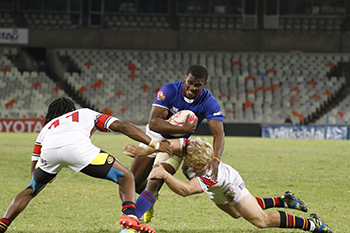Latest News Archive
Please select Category, Year, and then Month to display items
12 January 2024
|
Story Nonsindiswe Qwabe
|
Photo Sonia Small
 Since joining the UFS in 2008, Dr Grey Magaiza has worked extensively on approaches that can foster the socio-economic transformation of societies.
Since joining the UFS in 2008, Dr Grey Magaiza has worked extensively on approaches that can foster the socio-economic transformation of societies.
“The future should be one where communities can decide on their development agenda and futures. That’s the most important for me.” Dr Grey Magaiza, Deputy Director of the Centre for Gender and Africa Studies (CGAS) and Head of the Community Development programme on the Qwaqwa Campus, is passionate about capacitating communities to be agents of change and advancement. His vision for the future emphasises the empowerment of communities to take charge of their development by actively participating in decision making and the implementation of development projects that can improve their lives.
Since joining the UFS in 2008, Dr Magaiza has worked extensively on approaches that can foster the socio-economic transformation of societies. Over the years, he has crafted his research speciality into one that he is most proud of – being an interdisciplinary scientist immersed in the development of communities.
“I’m in a fortunate position of researching what I like. I say ‘fortunate’, because I’ve taken the time to understand what I’m passionate about, which is the overall field of rural livelihoods and livelihood futures – in short, community development. My research starts from an engaged university, understanding the elements that a university must use to enhance transformation and relevance to its immediate community in terms of development.”
One of the ways he has done this is by looking at social entrepreneurship as a development approach for young people in a rural setting. Through workshops with non-profit and civic organisations in Qwaqwa, Dr Magaiza has been helping these organisations to map out their needs and actively meet them through the involvement and support of external role players.
“We understand that communities are part of the national development agenda, but even that national agenda respects community knowledge and intentions and allows communities to shape their identity. A critical enabler of this is community organising. You bring back the capacity in communities to have dialogues on issues affecting them as spaces for engagement, knowledge exchange, and for people to just talk about their way forward.”
By enabling communities to define their development agenda, they can address their specific needs, challenges, and aspirations, he said. “When I look at livelihood futures, it’s quite an exciting aspect of my work – it’s like looking into a fortune tellers’ globe, because you’re not deciding for communities what they should do, but the communities themselves take those decisions.”
Young Shimla team reach Varsity Cup semi-final
2017-03-29

The Shimlas will be hoping that some of their stars,
like the brilliant flanker Phumzile Maqondwana, will be
on form in the 2017 Varsity Cup semi-final against
Tuks in Pretoria.
Photo: Johan Roux
The pressure in the Varsity Cup semi-final is on Tuks, which will be reason enough for Shimlas to play with freedom.
This is according to Jaco Swanepoel, Shimla assistant coach, on the big challenge awaiting his young rugby team in Pretoria on 3 April 2017. He says because Tuks are the favourites, it could be to the advantage of the visitors. Maties and the University of Johannesburg are playing in the other semi-final in Stellenbosch on the same day.
Tuks did Shimlas a favour
Tuks’ victory of 43-28 over the Pukke in Potchefstroom on 27 March 2017 helped the Shimlas, who had a bye, to end fourth on the log with 23 league points.
Shimlas had to make use of several new players this year, and few experts would have given them a chance of reaching the semi-finals. Swanepoel says although they are proud of this achievement, only a place among the top four was never their end-goal.
Good to be the underdog
The Shimlas lost their league match against Tuks in Bloemfontein with 19-65. This, as well as the fact that Tuks was at the top of the log with 34 league points, underlines the huge task ahead.
“The previous result (against Tuks) is encouragement for the players to show: We aren’t that much worse than Tuks,” says Swanepoel. “Perhaps it is good to be the underdog. We actually have no pressure on us and I hope the players feel the same way.”
Three teams in knockout matches
All three Varsity Cup teams from the University of the Free State (UFS) reached the knockout matches. Apart from Shimlas, the UFS Young Guns played against Tuks in a semi-final in Bloemfontein on 27 March 2017, but lost by 21-45. On 17 April 2017, Vishuis will meet the Puk’s Patria in the residence finals.